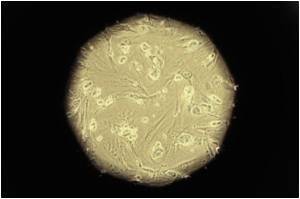A small molecule that interferes with cancer progression with minimal side effects has been identified by a team of scientists.

Because of the molecule's precision in targeting the protein interaction, the treatment does not appear to produce any side effects when tested animal tumor models.
"This complex represents one of the key focal points in the tumor-promotion," said Bogdan Olenyuk, assistant professor of pharmacology and pharmaceutical sciences at the USC School of Pharmacy, and one of two corresponding authors on a paper about the work. "However, targeting it for therapeutic intervention was a major challenge, since transcription factors do not possess the necessary topographical structures to make them good targets for mimicking drugs.
Instead, the team focused on blocking one of the transcription factor's binding partners – a large protein with complex topography that makes it an easier, more "druggable" target.
Teams of researchers from USC and NYU collaborated on the study. Olenyuk led the USC group, which included graduate students Ivan Grishagin and researcher Hanah Mesallati. Paramjit Arora, professor of chemistry at NYU and co-corresponding author on the paper, lead the NYU group, which included graduate student Brooke Bullock Lao and Thomas Brewer.
Their study appears this week in the Proceedings of the National Academy of Sciences (PNAS). The researchers have filed patent applications for the new design, which has already attracted the interest of several pharmaceutical companies.
"After completing my postdoctoral project in cancer gene regulation with my mentor Peter Dervan at Caltech and our collaborator Bill Kaelin at Harvard Medical School, I decided to make a major focus of my research on an interdisciplinary problem of targeting oncogenic transcription factors with designed drug-like molecules," he said.
So far, the molecules have only been tested animal models, but the researchers plan to take the appropriate steps to prepare for the next step – to translate these compounds into clinic.
Source-Eurekalert
 MEDINDIA
MEDINDIA




 Email
Email









